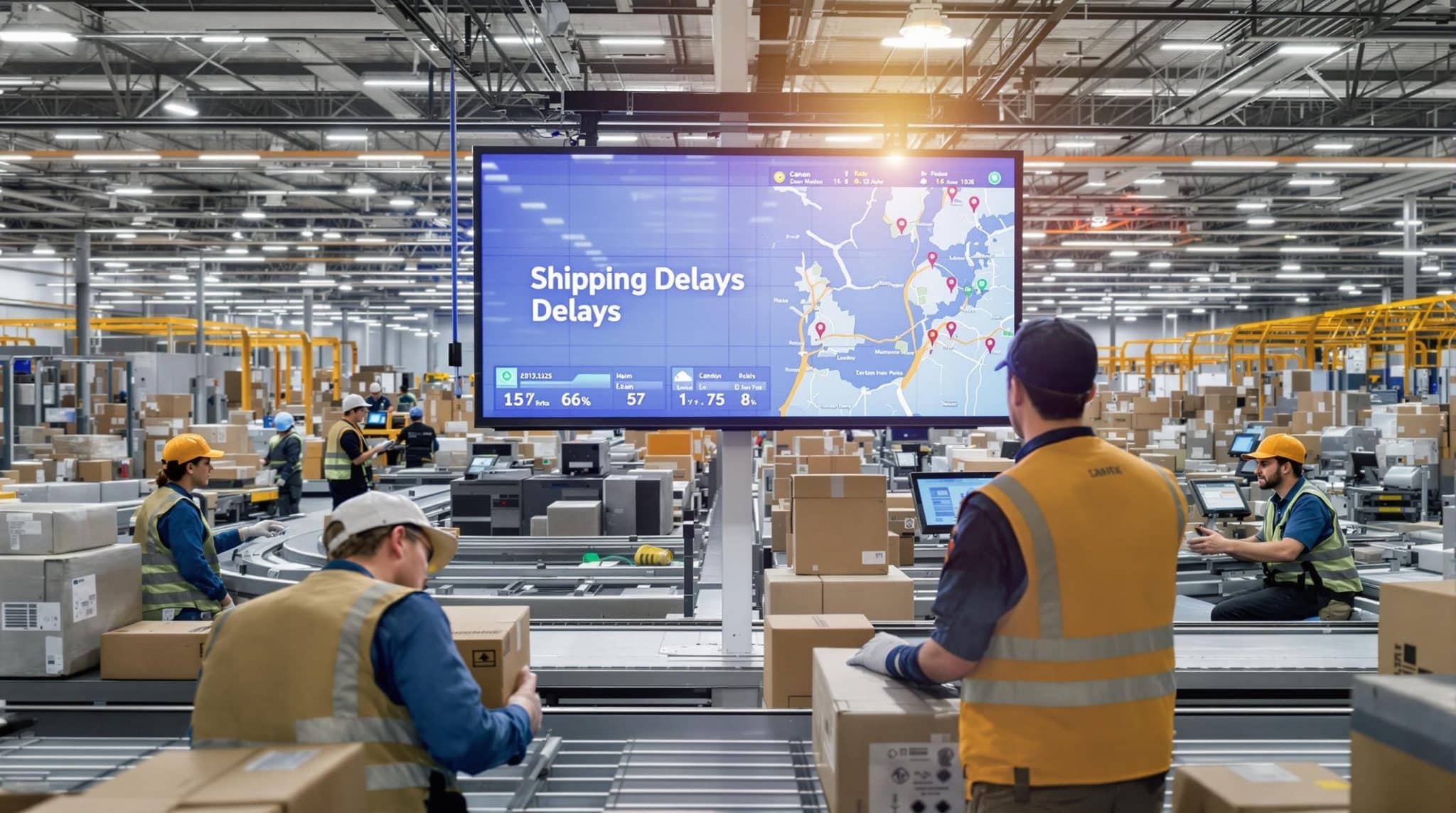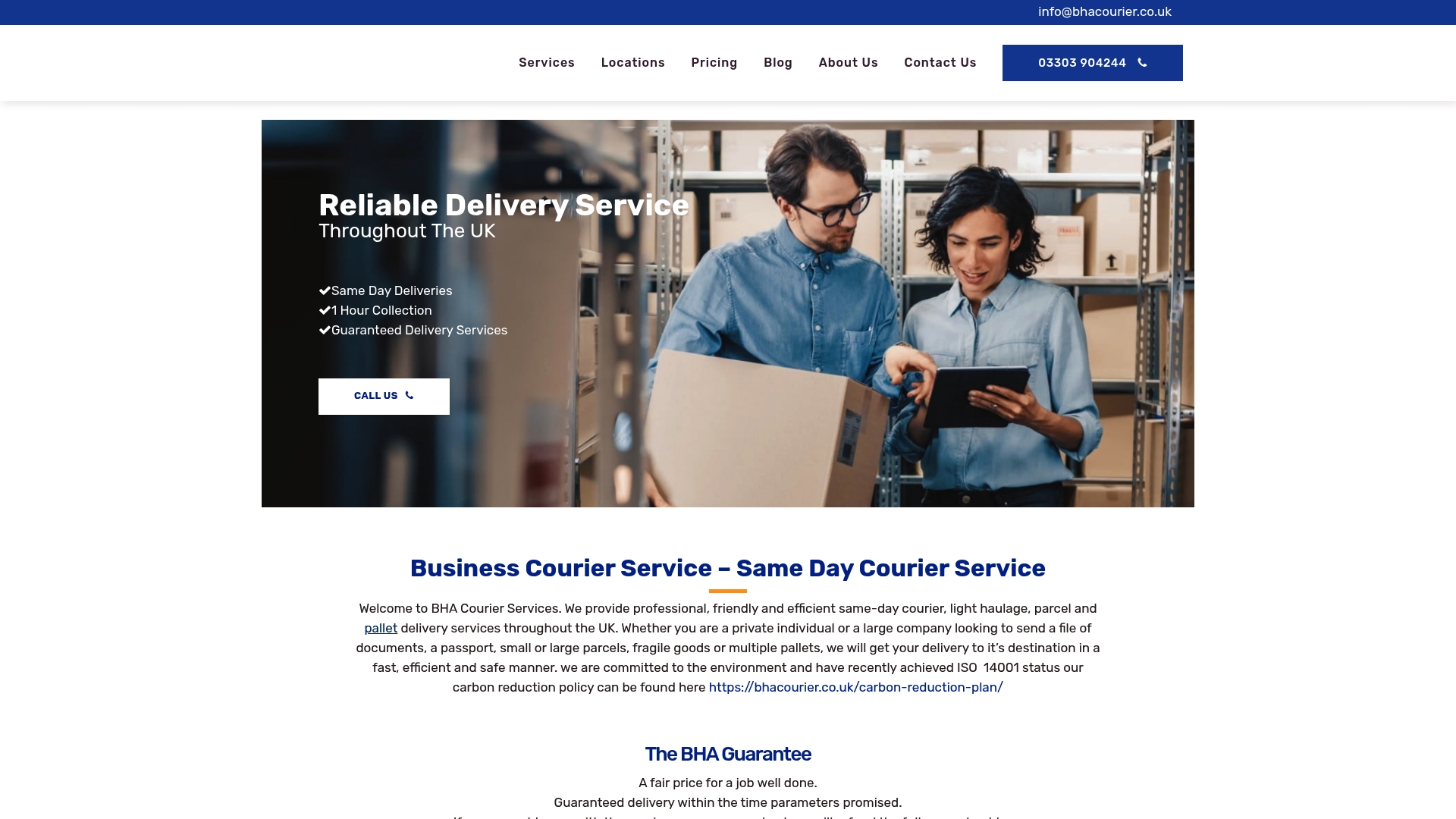
30 Jul What Causes Shipping Delays? Key Reasons and 2025 Solutions
Shipping delays keep catching everyone off guard and they affect nearly every industry across the globe. Did you know that severe weather alone can halt transportation for days or even weeks, causing huge backlogs and frustration for both customers and businesses? Most people blame slow couriers or traffic jams but the real story is far bigger and more surprising, woven from technology glitches, international politics and even climate change. The reasons behind shipping setbacks are far more unexpected than most imagine.
Table of Contents
- Common Reasons For Shipping Delays
- How External Factors Impact Deliveries
- Preventing Shipping Delays In Your Business
- Choosing The Right Courier And Technology
Quick Summary
| Takeaway | Explanation |
|---|---|
| Anticipate logistical challenges | Identify potential obstacles in transportation networks, such as traffic or weather. Prepare contingency plans to mitigate delays. |
| Address operational bottlenecks | Streamline administrative processes, ensuring accurate documentation and adequate staffing during peak seasons to avoid delays. |
| Leverage technology for tracking | Implement advanced tracking systems to monitor shipments in real time and enable timely responses to potential disruptions. |
| Evaluate courier reliability carefully | Assess courier capabilities, including delivery performance and handling competence to ensure timely and secure shipments. |
| Develop flexible logistics strategies | Create adaptable supply chain practices with alternative routes and diverse supplier networks to enhance resilience against delays. |
Common Reasons for Shipping Delays
Shipping delays are a persistent challenge in the logistics and transportation industry, impacting businesses and consumers alike. Understanding what causes shipping delays is crucial for managing expectations and developing effective mitigation strategies.
Logistical Challenges in Transportation
Transportation networks face numerous obstacles that can significantly disrupt delivery timelines. According to a global logistics report by McKinsey, infrastructure constraints and complex routing systems are primary contributors to shipping delays. Factors such as traffic congestion, road construction, and suboptimal route planning can add substantial time to delivery schedules.
Weather conditions play a critical role in transportation disruptions. Extreme weather events like snowstorms, hurricanes, and flooding can completely halt shipping operations, causing widespread delays across multiple regions. Research from the National Weather Service indicates that severe weather can interrupt transportation networks for days or even weeks, creating substantial backlogs in shipping logistics.
Operational and Administrative Bottlenecks
Behind every shipment are complex administrative processes that can create unexpected delays. Documentation errors, incorrect addressing, customs complications, and insufficient packaging can all contribute to shipping interruptions. Customs clearance, particularly for international shipments, often requires extensive paperwork and verification, which can significantly extend delivery timeframes.
During peak shipping seasons like Christmas or major sales events, shipping companies experience unprecedented volume. This surge can overwhelm existing infrastructure, leading to processing delays, reduced sorting efficiency, and longer transit times. Staffing shortages, equipment limitations, and increased parcel volumes create a perfect storm of logistical challenges.
Technology and Infrastructure Limitations
Modern shipping relies heavily on technological systems, and when these systems fail, delays cascade quickly. Software glitches, tracking system malfunctions, and communication breakdowns between different logistics partners can create significant bottlenecks. Outdated technology infrastructure in some shipping companies means they struggle to manage real-time tracking and efficient routing.
The increasing complexity of global supply chains means that a disruption in one segment can create ripple effects across entire shipping networks. A problem at a single distribution centre or with a specific transportation mode can trigger widespread delays, demonstrating the interconnected nature of modern logistics systems.
By understanding these common reasons for shipping delays, businesses and consumers can better prepare, set realistic expectations, and develop strategies to mitigate potential disruptions in their shipping processes.
To provide a clearer overview, the following table summarises the main causes of shipping delays discussed above and their key characteristics:
| Cause of Delay | Description | Typical Impact |
|---|---|---|
| Logistical Challenges | Traffic congestion, route planning, infrastructure limits, severe weather events | Transport halted or slowed |
| Operational/Administrative Bottlenecks | Documentation errors, customs delays, peak season surges, staffing shortages | Delayed processing, sorting backlogs |
| Technology & Infrastructure Limitations | System failures, outdated software, communication breakdowns, tracking issues | Missed deliveries, longer transit |
| External Disruptions | Economic sanctions, border restrictions, geopolitical or environmental factors | International/cross-border delays |
How External Factors Impact Deliveries
External factors represent complex and often unpredictable challenges that can dramatically disrupt shipping and delivery processes. Understanding these influences is crucial for businesses and logistics providers to develop robust contingency strategies.
Global Economic and Political Disruptions
Geopolitical events and economic instabilities have profound implications for shipping networks. According to NetSuite, international conflicts, trade restrictions, and economic sanctions can create substantial bottlenecks in global supply chains. The COVID-19 pandemic exemplified how rapidly external events can transform shipping dynamics, with lockdowns and border restrictions causing unprecedented logistical challenges.
Trade tensions between major economic powers can trigger immediate shipping complications. Sudden tariff implementations, export restrictions, or diplomatic disagreements can halt or significantly slow international shipments. These disruptions force companies to rapidly recalibrate their logistics strategies, often resulting in increased costs and extended delivery timelines.
Environmental and Climate-Related Challenges
Climate change has emerged as a critical external factor influencing delivery systems. Research from Linbis Logistics Software highlights how extreme weather events increasingly impact transportation infrastructure. Hurricanes, floods, wildfires, and unexpected temperature fluctuations can render transportation routes impassable, creating substantial delivery interruptions.
The maritime shipping sector is particularly vulnerable to environmental shifts. Rising sea levels, more frequent storms, and changing ocean currents challenge traditional shipping routes. Port infrastructures must continuously adapt to these changing conditions, which can lead to temporary closures and significant logistical recalibrations.

Technological and Infrastructural External Pressures
Rapidly evolving technological landscapes introduce additional external complexities to delivery systems. Cybersecurity threats, software compatibility issues, and infrastructure limitations can create unexpected shipping disruptions. Freightos reports that technological vulnerabilities can compromise entire shipping networks, leading to tracking errors, communication breakdowns, and systemic delays.
Global infrastructure variations further complicate shipping processes. Differences in technological capabilities, regulatory frameworks, and transportation standards across regions create inherent challenges. A same day courier service in Bristol must navigate these complex external factors to maintain efficient delivery standards.
Navigating these external factors requires sophisticated logistics management, adaptive technologies, and strategic planning. Businesses must develop flexible approaches that anticipate and mitigate potential disruptions, ensuring resilient and reliable delivery systems in an increasingly complex global environment.
Below is a summary table showing how different types of external factors impact shipping and the specific disruptions they cause:
| External Factor | Example Disruptions | Areas Most Affected |
|---|---|---|
| Economic/Political | Tariffs, sanctions, trade restriction, lockdowns | International shipments, cross-border trade |
| Environmental/Climate | Hurricanes, wildfires, floods, extreme temperatures | Maritime routes, regional transport |
| Technological/Infrastructural | Cyber threats, software failures, outdated systems | Tracking, coordination, delivery timelines |
Preventing Shipping Delays in Your Business
Minimising shipping delays requires a strategic and proactive approach that addresses potential disruptions before they impact your business operations. By implementing comprehensive strategies, companies can significantly reduce the risk of logistical complications and maintain customer satisfaction.
Advanced Planning and Risk Management
Research from machine learning studies demonstrates that predictive analytics can play a crucial role in preventing shipping delays. Businesses can leverage advanced algorithms to forecast potential disruptions and develop contingency plans. This approach involves creating detailed risk assessment models that anticipate potential challenges in the supply chain.
Effective inventory management is critical in preventing shipping delays. Companies should develop flexible inventory systems that can quickly adapt to unexpected challenges. This includes maintaining buffer stocks, diversifying supplier networks, and implementing real-time tracking technologies. By creating redundancy in supply chains, businesses can mitigate the impact of potential disruptions.
Technology and Communication Strategies
According to a comprehensive study on container terminal operations, data-driven decision-making is paramount in preventing shipping delays. Implementing advanced tracking systems and digital communication platforms allows businesses to identify and address potential issues in real-time. These technologies enable precise monitoring of shipments, providing early warning signals for potential disruptions.
Transparent communication with customers is equally important. Proactive notification systems that provide real-time updates about potential delays can significantly improve customer experience. [A same day courier service in Bournemouth demonstrates how immediate communication can mitigate the impact of potential shipping challenges.
Comprehensive Logistics Optimization
Optimising logistics processes requires a holistic approach that addresses multiple potential points of failure. This includes carefully selecting shipping partners, investing in robust packaging solutions, and developing comprehensive documentation processes. Businesses should conduct regular audits of their shipping procedures, identifying and eliminating potential bottlenecks.
Research from logistics experts suggests that companies should implement multi-layered strategies to prevent shipping delays. This involves:
- Developing alternative shipping routes
- Maintaining flexible inventory management systems
- Investing in advanced tracking technologies
- Creating clear communication protocols
By adopting a comprehensive approach to shipping management, businesses can significantly reduce the likelihood of delays. This requires continuous improvement, investment in technology, and a proactive mindset towards potential logistical challenges.
Ultimately, preventing shipping delays is an ongoing process that demands attention to detail, technological innovation, and strategic planning. Businesses that prioritize these elements can create more reliable and efficient shipping operations, ultimately improving customer satisfaction and maintaining a competitive edge in the market.
Choosing the Right Courier and Technology
Selecting the optimal courier service and implementing advanced technological solutions are critical strategies for businesses seeking to minimise shipping delays and enhance overall logistics performance. The right combination of carrier expertise and technological innovation can significantly transform shipping efficiency.
Evaluating Courier Capabilities and Reliability
According to NetSuite’s logistics research, businesses must conduct comprehensive assessments of potential courier partners. This evaluation should encompass multiple critical factors including delivery track record, geographical coverage, specialisation in specific shipping requirements, and technological infrastructure.
Key criteria for selecting a reliable courier include consistent on-time delivery performance, transparent tracking capabilities, adaptability to complex shipping scenarios, and proven expertise in handling various shipment types. Companies should request detailed performance metrics, customer testimonials, and references that demonstrate the courier’s reliability across different operational challenges.
The following table helps summarise key criteria for evaluating courier partners and how they impact delivery reliability:
| Evaluation Criteria | Why It Matters | Impact on Shipping Delays |
|---|---|---|
| On-time Delivery Performance | Indicates reliability and punctuality | Reduces risk of missed/late deliveries |
| Geographical Coverage | Ensures wide service range | Avoids routing and region delays |
| Tracking Capabilities | Enables real-time visibility | Allows quick response to disruptions |
| Specialisation in Shipment Type | Suits specific delivery needs | Prevents damage/mishandling delays |
| Technological Infrastructure | Supports integration/automation | Minimises system failure interruptions |
Technological Integration and Advanced Tracking Systems
Research from Cole International emphasises the transformative potential of advanced tracking technologies in modern logistics. Implementing real-time tracking systems allows businesses to monitor shipments continuously, providing unprecedented visibility into the entire delivery process.
Modern tracking technologies offer features such as GPS monitoring, predictive estimated arrival times, and instant notifications about potential disruptions. These systems enable businesses to proactively manage shipping challenges, reroute packages when necessary, and maintain transparent communication with customers. Learn more about our comprehensive courier insurance coverage to understand how technological solutions protect your shipments.
Strategic Technology and Carrier Selection Approaches
Developing a robust shipping strategy requires a holistic approach that balances technological capabilities with carrier selection. Businesses should consider creating a diverse carrier network that provides flexibility and resilience. This might involve partnering with multiple courier services specialising in different geographical regions or shipment types.
Technological solutions should integrate seamlessly with existing business systems, providing comprehensive data analytics and performance insights. Machine learning algorithms can help predict potential shipping delays, enabling businesses to implement preemptive mitigation strategies. Advanced software platforms can automatically select the most efficient carrier based on real-time conditions, optimising shipping routes and minimising potential disruptions.
Ultimately, choosing the right courier and technology is not a one-time decision but an ongoing process of evaluation, adaptation, and continuous improvement. Businesses that invest in sophisticated tracking technologies and maintain flexible, strategic partnerships with reliable courier services will be best positioned to navigate the complex landscape of modern shipping logistics.

Frequently Asked Questions
What are the main causes of shipping delays?
Shipping delays can occur due to various reasons, including logistical challenges like traffic congestion and extreme weather, operational bottlenecks such as documentation errors and staffing shortages, and technology limitations that affect tracking and communication.
How do external factors impact deliveries?
External factors such as global economic disruptions, environmental changes, and technological vulnerabilities can significantly affect shipping. These may include trade restrictions, climate-related incidents, and cyber threats that hinder delivery processes.
What strategies can businesses employ to prevent shipping delays?
Businesses can prevent shipping delays by utilising advanced planning, implementing risk management strategies, optimising logistics processes, and leveraging technology for real-time tracking and communication with customers.
How can I choose the right courier service to ensure timely deliveries?
To choose the right courier service, evaluate their on-time delivery performance, geographical coverage, tracking capabilities, specialisation in shipment types, and technological infrastructure to minimise the risk of delays.
Eliminate Shipping Delays with Proven Courier Solutions
Are you tired of seeing your business held back by unpredictable shipping delays, missed deadlines, or poor tracking? As highlighted in this article, operational bottlenecks and real-time disruptions can quickly erode customer trust and put your delivery schedule on the line. When every hour counts, you deserve peace of mind about your parcels reaching their destination securely and on time.

BHA Courier tackles these issues head-on with services designed for urgent and time-sensitive deliveries. From same-day courier collections to secure document transportation and real-time parcel tracking, we remove the guesswork from your logistics. Our rapid and guaranteed delivery solutions are backed by nationwide coverage and a robust online booking system, so your next delivery does not fall victim to unpredictable transport problems. Visit BHA Courier today to discover how our expertise can help you avoid costly delays and keep your business ahead. Act now to secure reliable courier support exactly when you need it.


